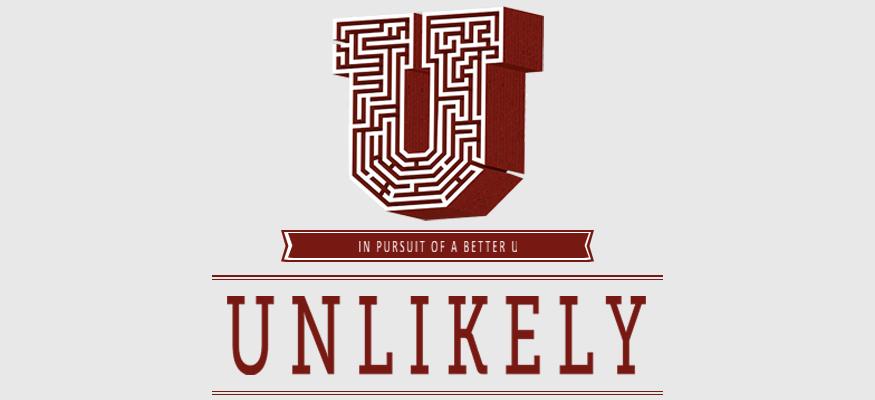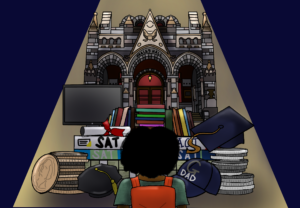Unlikely (2019) follows five individuals from different parts of America and their second chances at a college education. Directed and produced by award-winning husband and wife filmmaking duo and, Jaye and Adam Fenderson along with their team, this feature documentary aims to showcase the inequality that plagues the American higher education system. The film highlights the progress the country has made, showing that change is possible, while continuously emphasizing the problems that still need to be fixed. This combination creates a balance of hope and frustration for the viewers: hope that the system will change and frustration that there was ever inequality in the first place.
One of the directors, Jaye Fenderson, shared her personal motivations for creating the film with the Georgetown Voice, “It’s just one of those things that once you know about a problem, even though I wanted to work on other things, it just kept coming back to the issue and I wanted to make a documentary about the problems facing higher education and the system and how it’s broken.” Fenderson worked as an admissions officer at Columbia University, though her passion was always to work in film. The inequality facing students is a particularly important issue to Fenderson, who was a low-income student herself at Columbia. As time passed and she learned more about the inner workings of the system, Fenderson recognized that her own success story at Columbia was at odds with most people’s college experience.
The documentary comes at a pertinent time given the recent college admissions scandal. The media has been focused on these families that were exposed for paying large amounts of money to get their children into prestigious universities. With this highly public situation as the backdrop, Unlikely explores the larger problem: the college dropout crisis. Fenderson spoke on the issue: “The scandal is a symptom of a larger problem in our higher education system which is that we say that it’s a meritocracy, that if you work hard you can get into a good school. But we’re not graduating those students and so there is a disconnect between the message that we’re telling people and then the outcome that we’re seeing in the real world.”
Society makes it seem like once you get into college, the work is over. After four years of paying tuition and going to class, students graduate with a degree and find a good job. However, Unlikely reveals that only fifty percent of those who start college actually graduate. A large section of the documentary focuses on the problem of student debt. Students take out massive loans with the promise of a future degree to help pay them off. Those that fall behind and do not graduate are stuck with the debts and have no resources to help pay them off. Wealthy students at the top-rated colleges are surrounded by safety nets and resources to help them. They have an endless supply of second chances. For many others, particularly the low-income students that the documentary focuses on, the first time they get overwhelmed or fail to keep up with the high demands of college life marks the end of their college journey. On top of the already stressful college workload, many of them have to balance part-time jobs or family responsibilities. Fenderson wanted to show through the documentary that students aren’t getting access to resources such as academic counselors, scholarships, or tutoring which would help them to be successful in their new environment.
Fenderson described the current situation as a “sink or swim” system, arguing that, instead, it should be one that promotes collaboration and provides opportunities for success. The documentary mentions that American college completion rates are the lowest compared to eighteen other industrialized countries. The American economy needs more educated workers, but there are no effective systems in place to consistently provide educated graduates. The students suffer because of the flaws in the institutions. As long as the college system continues to emphasize prestige over success, the problem of inequality in America will only grow.
By featuring five unique individuals, Unlikely proves that the problem is in the system, not the individuals. It is not a matter of lazy students, but rather a problem of greedy institutions. Fenderson remarks, “when you look at it, a lot of people will point fingers at the students and say the students are the problem, but the truth is institutions haven’t changed. They haven’t innovated.”
Each individual mentioned in the documentary had a different story. However, they all had one thing in common: they wanted to succeed. One of the interviewees, Jalen, reflects on his personal struggle to keep up with university requirements. “Although I and other students have the drive, we just don’t fit into that stereotypical college mold.” The term often used for students who do not finish college is a dropout. The term is extremely demeaning and implies a lack of motivation or potential. Unlikely does a brilliant job of reframing the issue to showcase the untapped potential due to prejudices built into the American college system.
The documentary also included brief interviews with younger children. When they were interviewed, they spoke of their dreams of becoming doctors or getting a college degree. The dreams of the younger generation were free of the dread and desperation that characterized the interviews of those who had already been through the system. Failure is not predetermined, but if the system is constructed to favor those with advantages, then it might as well be. The people who are seeking a higher education have the motivation and passion to succeed. It is up to colleges to give them a fair chance to thrive.
Every student knows the importance of going to a prestigious university. High school students obsess over where they will go and what they can do to get in and make themselves stand out from the crowd. But what is a good college? One of the most intriguing parts of the documentary is a section that focuses on the American system of ranking colleges. A trend that started in the 1980s as a popularity competition, this ranking system has become an obsession.
Sara Goldrick-Rab, founder of the Hope Center for College Community and Justice in Philadelphia and a Professor of Higher Education and Sociology at Temple University, mentions in the documentary that she believes that the US News ranking is one of the worst things to happen to education because it gives a false impression of the college system. These rankings are determined by graduation/retention rates, assessment of excellence, faculty resources, student selectivity, financial resources, graduation rate performance, and alumni giving. The factors involved in the ranking only end up making schools who hoard money and reject low-income students look more prestigious. Colleges are so focused on prestige and ranking that they are hesitant to allow in students that might negatively impact these scores. This promotes the idea that schools with lower acceptance rates are superior, creating segregation in the system of higher education. Prestigious universities have high graduation rates because they let in only the students who are hard-wired for success because of the numerable resources and benefits at their disposal.
This distorted mentality held by well-renowned universities is one of the reasons Fenderson argues that the change that needs to happen in society won’t come from the top schools, but the ones with room to change. “I think schools that are changing are the ones that are scaling.” Unlikely mentions Georgia State and Arizona State for their efforts to promote the success of low-income students. They are just two examples of successful institutional change, but Unlikely also includes various examples of new ways students are getting an education outside of a traditional campus setting.
Many of the students featured in the documentary pursued non-traditional methods of education after struggling to find success. Programs mentioned include Year Up and College for America, both of which provide accessible education and job training. While the existence of these solutions proves that the system of higher education is slowly adapting to the needs of the individual, the change is too slow. “We’ve wrapped our heads around this idea that college is four years and that 18 to 22-year-olds go right after high school. The truth is that things have changed, we need to meet people where they are and offer pathways so that no matter where you are in life, if you want to get an education you’re able to.” New institutions are developing around the traditional framework, providing opportunities for second chances; however, Unlikely emphasizes the need for change in the existing institutions.
The detailed accounts of the five Americans help ground the enormous problem, thus making the documentary relatable, understandable, and heart-wrenching. It is clear that the root of the problem is not in the American people, but in the attitude towards higher education.
The documentary both describes the problem and presents success stories in order to establish a narrative that looks towards the future instead of dwelling on the current situation. Many of the individuals interviewed in the documentary achieve some form of degree by the end. In particular, Kalif, after finding success at Georgia State, graduated from Georgetown’s Master of Science in Foreign Service program in the spring of 2019. Unlikely features people fighting to fix the system and make college education more accessible, proving that everyone can access higher education if institutions make accessibility a priority. If low-income and marginalized students are left behind, then the United States as a whole will fall behind. The success of the country depends on the success of its people, and Unlikely emphasizes the importance of making higher education equally accessible for all people. The system needs to become more accessible, in order to provide a brighter future for all.








[…] Source link […]